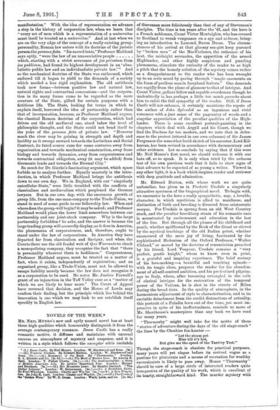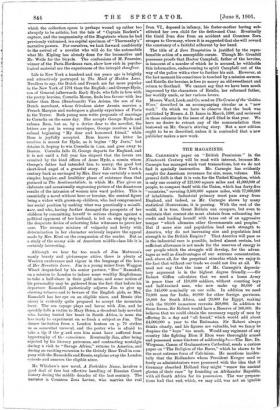NOVELS OF THE WEEK.*
Mn. NErz, MIINRO's new and aptly named novel has at least three high qualities which honourably distinguish it from the average contemporary romance. Doom. Castle has a really romantic motive, it diffuses and maintains with unusual success an atmosphere of mystery and suspense, and it is written in a style which follows the exemplar vitas imitabils • (1.) Doom Castle. ByNeil Munro. London : W. Blackwood and Sons. [Si. —(2.) Frederic Uvedale. By Edward Hutton. London W. Blackvrood and Smut. [66.]—(8.) Romances of ths Road. By " Thorraanby." London: H. A. Everett and Co. Cad. 6d.]—(4.) The Maid of Maiden Lane. By Amelia E. Barr. London : T. Fisher ljnwin. [6e.)—(5.) The Sentimentalists : a Story of Modern American Life. By Arthur Stanwood Pier. London : Harwr and Brothers. 16s.1—(6.) Her Monistain Lover. By Hamlin Garland. "The Dollar Library.' London : W. Heinemann. [48.]-7.) A Forbidden Nana*. By Fred w. London : Chatto and Wind-us. —(S.) A Sore Tempta- tion. By John K. Lays. London: Chatto and Wu:ulna. 68.] —(9.) The Cruise of tlis Golden Wave. 13y W. N. Owns:. London Ward, Lock, and Co. [38. ed.]
of Stevenson more felicitously than that of any of Stevenson's disciples. The time is ten years after the '45, and the hero is a French nobleman, Count Victor Montaiglon, who has crossed to Scotland to wreak vengeance on a spy and seducer, bring- ing an introduction to Lamond, Baron Doom. The circum- stances of his arrival at that gloomy sea-girt keep pursued by "broken men" of the MacFarlanes, the reticence of his host, the midnight serenades, the apparition of the armed Highlander, and other highly suspicious and puzzling phenomena, stimulate the curiosity of the reader to so high a pitch that the homely solution of the mystery comes rather as a disappointment to the reader who has been wrought up to an eerie mood by gazing through "magic casements on the foam of perilous seas in faeryland forlorn." One descends too rapidly from the plane of glamour to that of intrigue. And Count Victor, gallant fellow and capable swordsman though he undoubtedly is, has perhaps a little too much panache about him to enlist the full sympathy of the reader. Still, if Doom Castle will not enhance, it certainly maintains the repute of the author of John Splendid as an ingenious and vivid romancer with a just sense of the pageantry of words and a singular appreciation of the peculiar qualities of the High- lander. There is some excellent portrait-painting in the chapters which deal with Argyll and his Court, though we find the Duchess far too modern, and we note that in defer- ence to the protest (uttered in our own columns) of Sir James Fergusson the somewhat lurid sketch of his ancestor, Lord Kil- kerran, has been revised in accordance with documentary and other evidence. Let us conclude by saying that if this were Mr. Neil Munro's first novel, we should welcome it with our hats off, so to speak. It is only when tried by the arduous test of his own previous work that it fails to show signs of that advance to be expected of so young a writer. Viewed in any other light, it is a book which inspires reader and reviewer with deep gratitude and admiration.
Mr. Edward Hutton, with whose work we are quite unfamiliar, has given us in Frederic Uvedale a singularly attractive specimen of the biographical novel. To begin with, we encounter in the hero a really sympathetic, nay, a lovable, character, in which mysticism is allied to manliness, and distinction of birth and breeding is divorced from aristocratic morgue. For Uvedale is sprung from an old West Country stock, and the peculiar hereditary strain of his romantic race is accentuated by environment and education in the last of the line. But through all the phases of his childhood and youth, whether spellbound by the Book of the Graal or stirred by the mystical teachings of the old Italian priest, whether enamoured of the mere joy of living, fascinated by the sophisticated Hedonism of the Oxford Professor, "Walter Cleland," or moved by the doctrine of renunciation preached by his friend, Lord Venyour, Uvedale remains a "very perfect, gentle knight," whom to know, even in print, is a grateful and inspiring experience. The brief ecstasy of his love-making—a beautiful and touching episode— with its tragic close, prepares the reader for his abandon- ment of all self-centred ambition, and his predestined pilgrim. age to Italy, where, after becoming entangled in the coils of clerical intrigue for the restoration of the temporal power of the Vatican, he is shot in the streets of Milan during the bread riots. In the quality of atmosphere, in the harmonious adjustment of style to characterisation, and in its enviable detachment from the sordid distractions of actuality, this portrait of a Paladin born out of due time, yet most im- pressive in spite of his ineffectualness, reminds us more of Mr. Shorthouse's masterpiece than any book we have read for many years.
" Thormanby " might well take for the motto of these "stories of adventure during the days of the old stage-coach" the lines by the Cheshire fox-hunter " Let the steam pot Hies till it's hot, But give me the speed of the Tantivy Trot."
Though the stage-coach is obsolete for practical purposes, many years will yet elapse before its revived vogue as a pastime for plutocrats and a means of recreation for wealthy excursionists is likely to pass away. Hence " Thormanby " should be sure of a large circle of interested readers quite irrespective of the quality of his work, which is excellent of its hearty, straightforward kind. The murder mystery with which the collection opens is perhaps wound up rather too abruptly to be artistic, but the tale of "Captain Rocket's" capture, and the magnanimity of the Magistrate whom he had previously victimised, is a capital specimen of" Thormanby's" narrative powers. For ourselves, we look forward confidently to the arrival of a novelist who will do for the automobile what Mr. Kipling has already done for the locomotive and Mr. Wells for the bicycle. The confessions of M. Fournier, winner of the Paris-Bordeaux race, show how rich in psycho- logical material are the experiences of the intrepid chauffeur.
Life in New York a hundred and ten years ago is brightly and attractively portrayed in The Maid of Maiden Lane. Needless to say, the Dutch and French are far more popular in the New York of 1791 than the English ; and George Hyde, son of General (afterwards Earl) Hyde, who falls in love with the pretty heroine, Cornelia Moran, finds less favour with her father than Rem (Rembrandt) Van Ariens, the son of the Dutch merchant, whose frivolous sister Arenta marries a French Marquis and undergoes a ghastly experience of Paris in the Terror. Both young men write proposals of marriage to Cornelia on the same day. She accepts George Hyde and refuses Rem, but as, by a device dear to the novelist, the letters are put in wrong envelopes, George receives a kind refusal beginning "My dear and honoured friend," while Rem is joyfully accepted. Rein knows the letter he receives is meant for Hyde, as it begins "My Joris," but detains it, hoping to win Cornelia in t:me, and goes away to Boston. Cornelia falls ill, George departs for England, and it is not until a full year has elapsed that the lovers are reunited by the kind offices of Anne Hyde, a cousin whom George's father had intended him to marry, the good but short-lived angel of a graceful story. Life in New York a century back as envisaged by Mrs. Barr was certainly a much simpler, happier, and healthier phase of existence than that pictured in The Sentimentalists, in which Mr. Pier gives an elaborate and occasionally engrossing picture of the disastrous results of the intrusion of women into ward politics. This is essentially a novel without hero or heroine, the central figure being a widow with grown-up children, who had compromised her social position by making what was practically a mesalli- ance, and who, having further damaged the prospects of her children by committing herself to serious charges against a political opponent of her husband, is led on step by step to the desperate device of suborning false witnesses to prove her case. The strange mixture of vulgarity and levity with determination in her character seriously impairs the appeal made by Mrs. Kent on the compassion of the reader. But as a study of the seamy side of American middle-class life it is certainly interesting.
Although we hear far too much of Jim Matteson's manly beauty and picturesque attire, there is plenty of Western exuberance and vigour in the language of the hero of Her Mountain Lover. Jim is a young miner from Waggon Wheel despatched by his senior partner, " Doc " Ramsdell, on a mission to London to induce some wealthy Englishman to take a half-share in their gold mine, and some notion of his personality may be gathered from the fact that before his departure Ramsdell pathetically adjures Jim to give up chewing tobacco and to beware of the English girls, as Mrs. Ramsdell has her eye on an eligible niece, and Bessie (the niece) is evidently quite prepared to accept the mountain lover. The sea voyage plays sad havoc with Jim, and he speedily falls a victim to Mary Brien, a decadent lady novelist who, having buried her heart in South Africa, is none the less ready to experiment on so fresh a subject as Jim. The dinner invitation from a London hostess on p. 70 strikes us as somewhat unusual, and the porter who is afraid to take a tip if the g:ard sees him must have suffered from hypertrophy of tin conscience. Eventually Jim, after being rejected by his literary patroness, and contracting nostalgia during a visit to "Savage Africa," returns to America, and during an exciting excursion to the Grizzly Bear Trail in com- pany with the Ramsdells and Bessie, explains away the London episode and annexes the eligible niece.
Mr. Whishaw's new novel, A Forbidden Name, involves a good deal of free but effective handling of Russian Court history during the middle decades of the last century. The narrator is Countess Zora Levine, who marries the real Ivan VI., deposed in infancy, his foster-mother having sub- stituted her own child for the dethroned Czar. Eventually the timid Ivan dies from an accident and Countess Zora escapes to Germany, where it is suggested that she will reward the constancy of a faithful adherent by her hand.
The title of A Sore Temptation is justified by the repre- hensible action of a susceptible curate. Though Mr. Grenfell possesses proofs that Hector Campbell, father of the heroine, is innocent of a murder of which he is accused, he withholds this information, endeavouring to spirit Campbell out of the way of the police with a view to further his suit. However, at the last moment his conscience is touched by a mission sermon, and Estelle, the heroine, is free to marry an old sweetheart and return to Scotland. We cannot say that we have been much impressed by the characters of Estelle, her reformed father, her worldly uncle, or her various lovers.
Messrs. Ward, Lock, and Co. send us The Cruise of the' Golden Wave,' described in an accompanying circular as a "new work." On which we have to observe that the book was published by Messrs. A. D. Innes in March, 1899, and reviewed in these columns in the issue of April 22nd in that year. We have no desire to retract any of the commendation then bestowed on Mr. Oscar's stirring story. But a new edition ought to be so described, unless it is contended that a new publisher makes a new work.







































 Previous page
Previous page